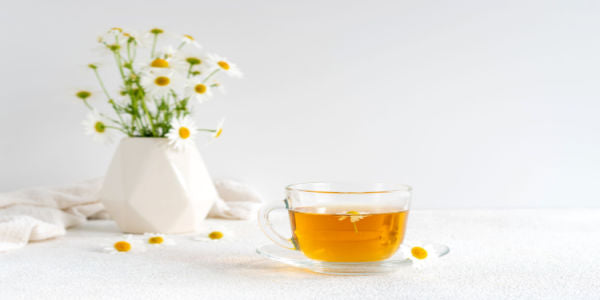
Chamomile tea has been around for a while, reportedly used medicinally by the Greeks, Egyptians, and Romans as early as 500 BC. The benefits of drinking chamomile tea have been widely shared, but modern medicine is still catching up to confirm certain benefits. And can you really use chamomile tea for weight loss?
Find out the top benefits of chamomile tea, including chamomile tea nutrition facts and chamomile tea benefits beyond nutrition.
Chamomile Tea Nutrition Facts
Chamomile has been used as food for centuries. The chamomile flowers of the plant are commonly taken as an herbal tea. In fact, chamomile tea is among the most popular with about a million cups being consumed every day.
The traditional medicinal preparation of chamomile tea contains about 150 mL boiling water—a bit more than ½ cup, or about 5 fluid ounces—poured over 3 grams of chamomile flowers. The tea is kept covered for about 5-10 minutes and then passed through a strainer. This formulation can be used 3 or 4 times daily, although many people find a singular use to be sufficient.
If you’re not preparing your own chamomile flowers, a prepared tea bag typically contains 1-2 grams of tea leaves or herbs. Since many blends and mixes are available, you’ll want to look for “100% chamomile” on the label.
Keep in mind that chamomile also goes by other names (such as the Spanish “manzanilla”), and a quick Google search in the store aisles can help you decipher added ingredients.
When it comes to nutrition, 1, 8-ounce cup of brewed chamomile tea contains:
• Calories: About 2 calories
• Total Carbohydrates: 0.47 grams
• Potassium: 21.33 mg
• Vitamin A: 47.4 IU
With zero saturated fats and a plethora of other vitamins and minerals, chamomile tea is often considered a “superfood.” A cup of chamomile tea can complement a healthy diet without adding very many calories, making it a great tea for weight loss.
Keep in mind that the values above are for chamomile tea without anything added. Mixing in sugar or milk can increase the amounts of fats, sugars, and protein in the tea.
So, whatever items you add to the tea can change the nutritional composition—for better or worse.
10 Benefits of Chamomile Tea
In addition to nutrition, chamomile tea may have other health benefits. From ancient remedies to more modern applications, here are 10 potential benefits sipping chamomile tea may provide.
1. May Reduce Spasms
Chamomile tea contains special spasmolytic compounds called flavonoids, which are known to benefit the body. Essentially, these compounds can contribute to a calming effect on the body.
Chamomile tea has been used to promote smooth muscle movements and help relax the central nervous system in the following conditions:
• Bruxism (grinding of teeth)
• Inflammatory bowel disease (IBS)
• Joint or body pain (i.e. knee swelling or lower back spasms)
2. Can Cause Calm Feelings
The scent of chamomile has been used extensively in aromatherapy. Its main uses are to aid in the reduction of pain or anxiety. This is why many massage and bath products include chamomile scent.
A cup of tea can provide similar feelings of calm if you appreciate the aroma as it cools to the drinking temperature.
3. May Alleviate Anxiety
In addition to providing a sense of calm, chamomile tea may offer mental health benefits for those with generalized anxiety disorder (GAD). While many people prefer taking chamomile dietary supplements, including the practice of drinking chamomile tea during your day may be helpful in reducing stress.
Routines and daily rituals—like drinking chamomile tea—can be helpful to structure the day and remove regular stressors.
4. May Support Postpartum & Menstruating Women
Women can face many postpartum struggles, from sleep deprivation to postpartum depression. As a supplementary approach, chamomile tea may help reduce symptoms of depression and alleviate physical symptoms related to sleep disturbances.
In fact, it is often thought that chamomile’s botanical name (Matricaria) shares its root with the word matrix, a Latin word that can generally refer to the womb. Anciently, chamomile was used to treat many gynecological diseases.
Chamomile tea may also be effective in reducing period-related pain. Menstrual bleeding is often accompanied by painful cramps or other symptoms, and adding chamomile tea to your diet can be a subtle yet supportive way to help reduce this discomfort. With a portable mug, it can be enjoyed at work, in the car, or at home.
5. Support for Better Sleep Quality
Most of the existing scientific studies on chamomile extract and chamomile teas examine their effect on sleep. With minimal to no side effects, chamomile teas and extracts are considered natural and safe sleep aid.
As with other herbs or medications you may be using, be sure to ask your healthcare team about chamomile products before beginning use.
6. Potential Anti-Inflammatory Properties
While many anti-inflammatory properties are attributed to the use of chamomile in topical products (like lotions), the flowers turned into tea also offer anti-inflammatory benefits. Although less potent than its extract form, chamomile tea contains phytochemicals, which are compounds with antioxidant activity.
Antioxidants work within the body to reduce the effects of physical stress the body experiences, like inflammation, cell damage, or injury.
7. Can Improve Glycemic Control
A recent study on people with type 2 diabetes found that chamomile tea may help with glycemic control. Another study showed promise, as patients experienced lowered A1C and serum insulin levels.
Additionally, total cholesterol, low-density lipoprotein cholesterol (LDL or “bad” cholesterol), and triglyceride counts were decreased when participants of the study drank chamomile tea 3 times a day for 8 weeks.
While more in-depth studies are needed, these findings are valuable, suggesting that chamomile may have a therapeutic role for people with diabetes.
8. Caffeine-Free Productivity
Although it’s considered only a mild stimulant, caffeine can have serious side effects. While it can increase alertness, it can also increase heart rate, affect sleep, and cause withdrawal symptoms (i.e. headaches, muscle pain, irritability).
While coffee offers a jolt of energy, consider switching to chamomile tea. It can help contribute a calming effect to the body and allow you to continue your tasks in a productive manner. It may seem counterintuitive, but adding a sense of relaxation to your day may be just the boost you need.
9. May Ease An Upset Stomach
Digestive distress can be uncomfortable during the day and keep you up at night. Although more scientific studies are needed, preliminary research suggests chamomile tea may alleviate an upset stomach, reduce gas, and reduce stomach spasms.
Chamomile tea is regarded as a generally safe way to alleviate these symptoms, meaning it may be worth a try. Some experts say it is even safe for kids, although you’ll want to check with your doctor or dietitian first.
10. Can Protect Against Chronic Disease and Cancer
Due to antioxidant compounds, chamomile may be able to provide protection against chronic diseases, like diabetes or heart disease. A recent study found that drinking chamomile tea multiple times a week may also protect against certain types of cancer.
The tea made from chamomile flowers is continually studied for its effects on the elderly population, and drinking the tea is thought to be a key component to leading a long and healthy life.
Chamomile Tea for Weight Loss: Does It Work?
While chamomile tea can aid in your weight loss journey, it’s certainly not a “magic bullet” or cure. Since it is a low-calorie drink, it may help you stick to your goals while losing weight.
Chamomile tea should not replace a meal, but rather should be a drink added to your routine that supplements your other healthy habits (i.e. balanced diet, exercise, sufficient sleep).
The Bottom Line on the Benefits of Chamomile Tea
From herbal aromas to sleep support, chamomile tea offers plenty of potential benefits. Although it’s generally considered safe, check with your doctor or dietitian beforehand to make sure drinking tea won’t have side effects for you.
Once you get the “green light” from your healthcare team, you can enjoy it multiple times a day to help relax your body and mind.
Related Questions
What is chamomile tea good for?
Chamomile tea contains vitamins and minerals while generally providing under 5 calories a cup. It can be added to a healthy diet to promote weight loss and relaxation, and may even alleviate anxiety and pain.
Is chamomile tea good for you?
The amount of chamomile found in tea is considered safe, and may even provide potential health benefits. Chamomile tea has been used for centuries as medicine, and modern medicine is even supporting its role in preventing chronic disease.
Keep in mind that chamomile contains a small amount of a compound called coumarin, which can interact with blood thinners. If you are taking blood-thinning medication, drinking chamomile tea may not be the right choice for you.
Is chamomile tea good for sleep?
While chamomile tea can be used on its own to potentially improve sleep quality, it is best used as a complementary approach. In other words, you’ll likely reap the most benefit when you combine drinking chamomile tea before bed with good sleep hygiene and other healthy habits.
References:
Caffeine: How to Hack It and How to Quit It. Cleveland Clinic. Published December 2020.
Catani MV, Rinaldi F, Tullio V, Gasperi V, Savini I. Comparative Analysis of Phenolic Composition of Six Commercially Available Chamomile (Matricaria chamomilla L.) Extracts: Potential Biological Implications. Int J Mol Sci. 2021;22(19):10601.
Chang SM, Chen CH. Effects of an intervention with drinking chamomile tea on sleep quality and depression in sleep disturbed postnatal women: a randomized control trial. J Adv Nurs. 2016;72(2):306-15.
Chamomile. National Center for Complementary and Integrative Health. Published May 2020.
Ellis E. Supplements and Ergogenic Aids. EatRight. Published October 2018.
Griffin M. What Is Chamomile? WebMD. Published March 2021.
Hieu TH, Dibas M, Dila KAS, Sherif NA, Hashmi MU, et al. Therapeutic efficacy and safety of chamomile for state anxiety, generalized anxiety disorder, insomnia, and sleep quality: A systematic review and meta-analysis of randomized trials and quasi-randomized trials. Phytother Res. 2019;33(6):1604-1615.
Introduction to Chamomile. American Botanical Council.
Mao JJ, Xie SX, Keefe JR, Soeller I, Li QS, Amsterdam JD. Long-term chamomile (Matricaria chamomilla L.) treatment for generalized anxiety disorder: A randomized clinical trial. Phytomedicine. 2016;23(14):1735-1742.
McCulloch M. Medicinal Herbal Teas. Todays Dietitian. Published December 2016.
Niazi A, Moradi M. The Effect of Chamomile on Pain and Menstrual Bleeding in Primary Dysmenorrhea: A Systematic Review. Int J Community Based Nurs Midwifery. 2021;9(3):174-186.
Nutrition Facts (Tea, herb, chamomile, brewed, 1 cup (8 fl oz). University of Rochester Medical Center.







